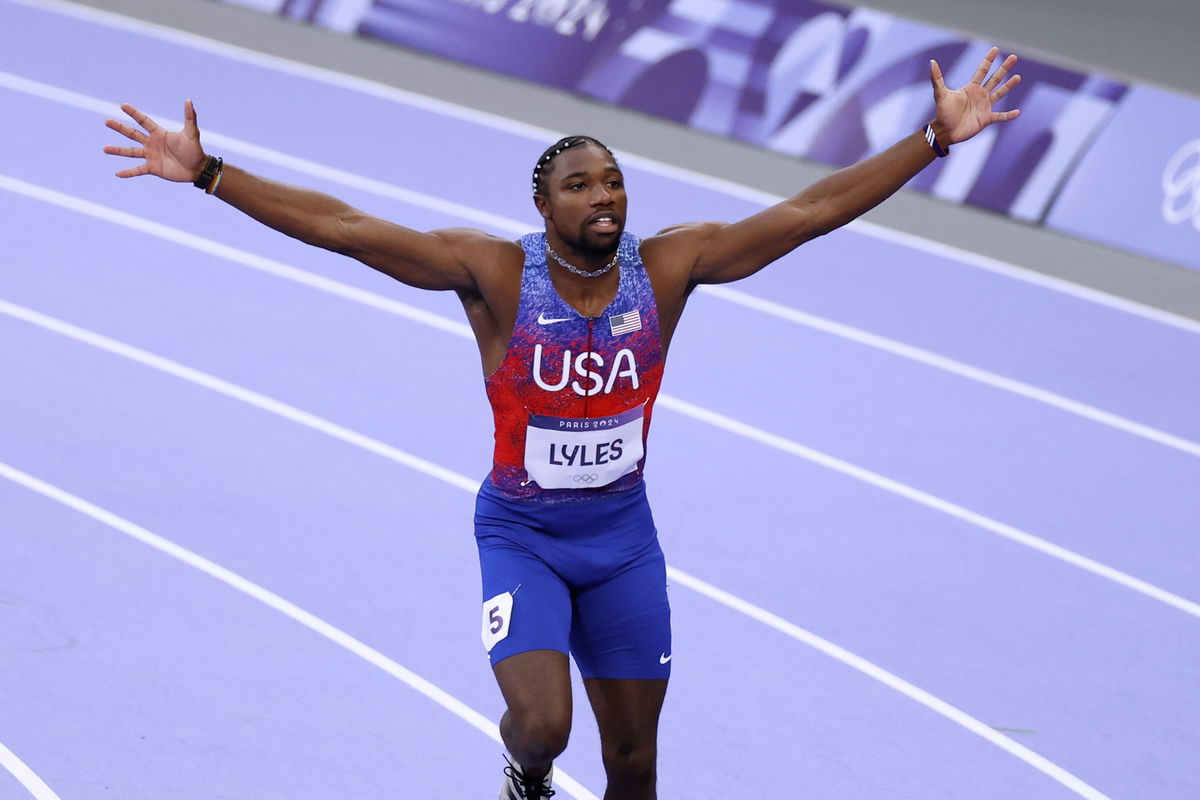
Imago
LYLES Noah Team USA 7.Tag Leichtathletik 200m Maenner Finale Paris Olympische Spiele 2024 08. 08. 2024 Paris *** LYLES Noah Team USA 7 Day Athletics 200m Men Final Paris Olympic Games 2024 08 08 2024 Paris Copyright: xLacixPerenyix

Imago
LYLES Noah Team USA 7.Tag Leichtathletik 200m Maenner Finale Paris Olympische Spiele 2024 08. 08. 2024 Paris *** LYLES Noah Team USA 7 Day Athletics 200m Men Final Paris Olympic Games 2024 08 08 2024 Paris Copyright: xLacixPerenyix
Olympian gold medalist Noah Lyles is not just a track and field athlete. The former title holder oozes a non-conformist streetwear swag—Lyles brings a unique energy to the track beyond his athletic ability.
Watch What’s Trending Now!
Lyles’ approach to both the track and brand is inspiring and unsettling, as he openly advocates his personality in the sport. He views everything in a race as being more than just the mere action of sprinting to the finish, but a display of style, charisma, and perseverance. It makes him both a good athlete as well as a marketable icon. Lyles’ journey shows a broad narrative and one shaped by his mentor, Tyson Gay, whose influence helped Lyles to work on his personality along with speed, which adds depth to his identity as an athlete, and attracts brands to him like bees…
ADVERTISEMENT
Lyles’ million-dollar strategy fine-tuned his personality into profit
Noah Lyles has successfully branded himself, which has made him highly sought after by big-name brands; for instance, his deal with the Swiss luxury watch brand Omega. Omega, the 2024 Olympics’ official timekeeper, which is widely known for its past with famous sporting individuals and flaunts over $200 million in net worth, brought to Lyles the vigor and charm. To Lyles, endorsements that give way to more are not just financial matters; for him, it is a collaboration with brands that appreciate his ambition and creative style. “I wanted to make sure that I was a dominant figure, and a dominant figure needs dominant brands to go with him,” he stated, reflecting his belief that his brand is as valuable as his medal count.
Lyle’s way of giving himself confidence is not only in his sports gifts, but it succeeded in becoming his very defining image in front of others. Also, it helps that Lyles himself sees himself as something of a fashion icon. With braids studded with pearls and painted nails during races that leaves some in awe and turns others into critics, the young athlete has a way to stand out in a crowd. And maybe that’s exactly what brands want—the swagger to say, “Love it or hate it, you can’t escape it.”
Top Stories
Forced to Leave FOX, Cowboys Legend Troy Aikman Says ESPN Is Like ‘U.S. Government’ & Clearly Distinguishes the Two Networks
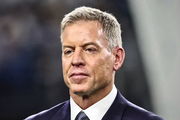
Todd Bowles Points Fingers at Baker Mayfield & Co. in a Strong Statement That Could Get Him Punished After Bucs Loss
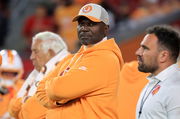
What Settlement Agreement Have Michael Jordan & NASCAR Reached? Everything to Know From Evergreen Charters to Payout
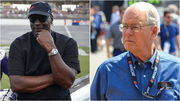
Arthur Blank Makes Firing Decision on Raheem Morris After Falcons HC Lands on Hot Seat
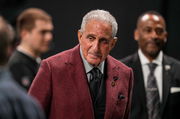
Cowboys Legend Troy Aikman Teases NFL Comeback After Airing FOX’s Dirty Laundry

Charley Hull Opens Up on Traumatic Divorce from Ex-Husband for the First Time Ever

“I wear the hat of being a showman and I have a lot of confidence because I’ve been through a lot to say, ‘Hey, I’ve been through this moment, I can fight through it again. ‘ And those are the type of things some people just don’t get to see,” Lyles explained last year.
ADVERTISEMENT
Case in point: This is the same Noah Lyles, who launched a barrage of criticism against him when he took a dig at the NBA. In a conversation in August last year, the star had said, “You know the thing that hurts me the most is that I have to watch the NBA finals and they have “world champion” on their head. World champion of what? The United States? Don’t get me wrong. I love the U.S., at times, but that ain’t the world. That is not the world. We are the world. We have almost every country out here fighting, thriving, putting on their flag to show that they are represented. There ain’t no flags in the NBA.”
And this is the same Noah Lyles who brought home the 100m gold to the US after two decades (male or female) since Justin Gaitlin in 2004, Athens, exactly a year after the NBA episode.
ADVERTISEMENT
This confidence now suits him, making him one of the most marketable athletes in track and field. The fact that he won a 200-meter world title at the 2019 World Championships and continued to win sprints is manifested in his sports successes. But for Lyles, each victory is an opportunity to strengthen his brand. He knows that a player’s marketing value can be as big as their records and makes sure that strategy works every time.
Hence, it’s not surprising that when Lyles created history beating Kishane Thompson by a miniscule 0.005 seconds, he had an Omega Speedmaster Apollo 8 Dark Side of the Moon with a perforated leather strap (so it wouldn’t slow him down) wrapped on his wrist.
Apart from his individual success, Noah Lyles is turning the sport into a new dream. He is convinced that by putting his spark of excellence in the spotlight, he will galvanize the crowd and effect an “everybody” response to track and field. “I walk out there; I know I’ve got the right watch, the right rings, the right hairstyle. You can tell yourself, ‘This is going to be big, but it’s also going to be fun, because I’m going to look my best and feel my best,'” he shared, highlighting the inseparable connection between his image and his performance.
ADVERTISEMENT
Earlier this year, the Olympic gold medalist also signed a huge deal with Adidas that is reportedly “the richest contract in the sport of track and field since the retirement of Usain Bolt”, and will extend through the 2028 Olympics in Los Angeles. While the exact amount has not been revealed due to Non Disclosure Agreements, reports state Bolt made $34.2 million dollar from his deal with PUMA, which amounts to over $10 million annually. Hence, former runner Kyle Merber speculated, “If this is richer and through 2028 then is it safe to assume this contract is at least $2.3M/year.”
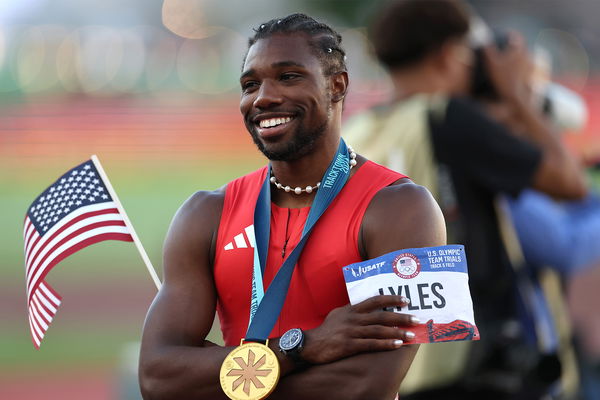
ADVERTISEMENT
But how exactly does Noah Lyles do it all?
ADVERTISEMENT
Tyson Gay’s influence over Lyles and the power of personality
In the journey of Lyles to the top, his mentor, Tyson Gay, the legendary American sprinter, has been a primary guiding force. Differing from Gay, Lyles was more of a reserved character who preferred to be the subject of admiration because of his astonishing achievements and speed. But, according to Gay, Lyles brought in a different but equally powerful approach. Lyles frequently gives Gay the credit in his case; he was the man who taught him that self-confidence is very important not only on the track but also beyond it. Referring to his experience, he says, “They noticed me when I was rising through the ranks, and they saw something in me.”
Notably, the 100m phenom has gained a lot from the introduction of Tyson Gay, who showed him how to crumble limits through attitude and flair mixed with performance. Gay cared about developing good track athletes who were aware of being successful. For Lyles, this meant to be “peacocking” without regrets, as he puts it, with his look and conduct. He spills gently, “You need to remember that this is all fun. It’s supposed to be fun. It’s what you dreamt of.”
ADVERTISEMENT

Lyles has turned the concept of a track star into a 21st-century phenomenon through his belief in this mentality. For Lyles, victory has come to mean more than just finishing first, but to work on personality to make it profitable. The approach that Lyles is following will surely make him reach the next level, making him not just an athlete but a brand, skillfully channeling his individuality into a lucrative strategy.
ADVERTISEMENT
This very strategy strategy underscores that for modern athletes, personality is as important as winning—a point further discussed by former sprinter Michael Johnson. “We’re seeing the greatest collection of stand-out personalities in this sport since I was competing,” talking about icons like Sha’Carri Richardson and the gold medalist, before continuing, “The type of energy Noah brings, it’s fantastic. He’s unafraid to have that spotlight on him and go out there and perform.”
Having said that, should more athletes showcase their personalities while branding to have a broader sphere of influence? Lyles’ success due to his genuineness suggests that the sky is the limit for those who dare to be there.
ADVERTISEMENT
ADVERTISEMENT
ADVERTISEMENT

